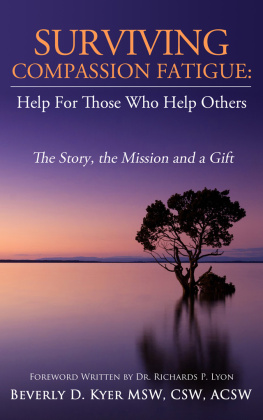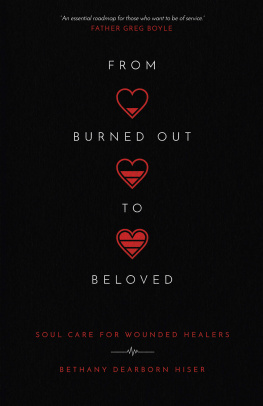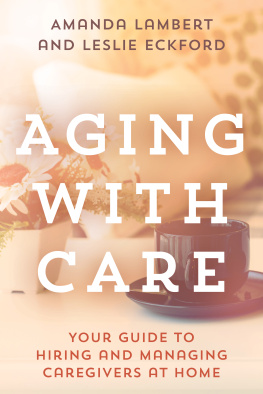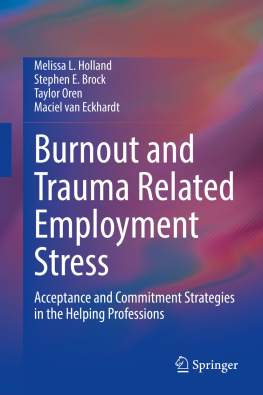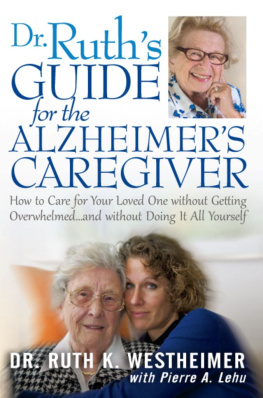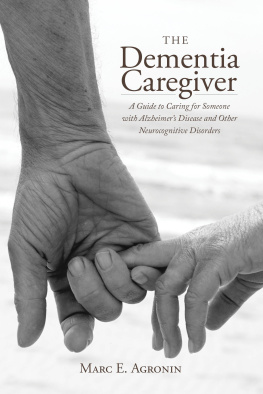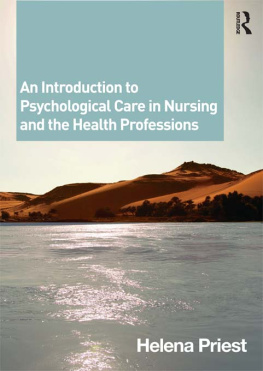
Additional Acclaim for Surviving Compassion Fatigue:
Beverly Kyer has written a book of healing for those not only in the healing professions but relevant to all human Beverly D. Kyers powerful book provides much needed information to support caregivers. In reading her book; I discovered so many of us are impacted by compassion fatigue. In the sharing of her personal story, important caregiver statistics, the wisdom and practical steps she brings awareness and support to our caregivers in needed and powerful ways. She speaks so powerfully to making sure we are caring for the caregivers....beginning with caregivers discovering how to take care of themselves first so that they arent serving from a place of depletion. This book is a valuable resource for caregivers and I believe a for all of us to develop a better understanding of compassion fatigue. Compassion fatigue, I believe, will either effect you directly, or someone you know. The more informed and empowered we become, the healthier, more balanced, vibrant, our lives and those of caregivers (on those they support) will be.
- Rebecca Hall Gruyter, Womens Empowerment Leader
Beverly Kyer has written a book of healing for those not only in the healing professions but relevant to all human services workers...not merely social workers, but teachers, police officers, firefighters, ministers, and administrators. Surviving Compassion Fatigue should be a required course for all undergraduate and graduate level students entering into human services work and this book should provide the framework.
- Bryan Post,CEO www.postinstitute.com
Published by Gatekeeper Press
3971 Hoover Rd. Suite 77
Columbus, OH 43123-2839
Copyright 2016 by By Beverly D. Kyer, MSW, CSW, ACSW
All rights reserved. Neither this book, nor any parts within it may be sold or reproduced in any form without permission.
Layout Design by: Mr. Merwin D. Loquias
ISBN: 9781619844902
eISBN: 9781619844919
Printed in the United States of America
To God, who is my source, and for my life, assignment, and gifts for this mission.
And to my children, Michael, Melvina, and Jamal for being my pride and inspiration
We delight in the beauty of the butterfly, but rarely admit the changes it has gone through to achieve that beauty.
Maya Angelou
Acknowledgements
My Gratitude goes to the following:
My family in California, Florida, France, Georgia, New Jersey and New York City
Dr. Richards Lyon who always endeavored to ease my stress every time I brought my child to him for care. Thank you for your totally loving and compassionate care
Bishop Carl C. Smith for leading me to embrace the Covenant Promises
My Publisher Cy Forh and Editor Jonathan Williams for believing in my work
My Cardiologist who wishes anonymity; who made the right diagnosis.
Peter Challenor, my Acupuncturist and Dr. Robert Woodbine, the healing voice from across the country, whose wisdom and skill aided and sustained me on my journey to wellness
My neighbor Joanne, who drove me to cardiac rehab
The courageous contributors who shared their stories:
Brian Post for introducing me to the construct called compassion fatigue
John Prindle, whose book inspired me to finish writing mine
Loral Langemeier for teaching me entrepreneurial practices
Sylvia High for helping me to discover and move through the blind spots to achieve my goals
John Robinson who shared knowledge to finish this book
Vicki Ward for her very generous mentoring on self-publishing
Bob Friend, my former Supervisor who developed and nurtured my knowledge of the Child Welfare System
Jakki Koslow, Sylvia Pizzini and Morgen Hume for invaluable linkages to resources and data from The Child Welfare system
The great folks at Steeltown Caf in Pittsburg CA. for the perfect atmosphere and customer service for a writer
To my neighbor Michelle who has a sharp eye for grammar and context
Foreword
I am thrilled that Beverly should believe I share her views. As a pediatric urologist, I have enjoyed her faith and friendship for all of the years as we have worked with her son Jamal, who carries on his mothers intents and wisdom in this ever-changing world.
A caregiver is a relatively new profession, although it has been a no name practice for centuries. It is now more demanding as we live longer, but pay the ever more demanding price of wars creation, seeming never to diminish.
The caregiver is just as much at risk as a young battle fatigue survivor. The caregiver, too, must order his or her life to make for continued effectiveness. Beverly is among the first to recognize this, as she translates her own life threatening experiences into a gospel of positive thinking and acting. Her story is likely to be a classic as she includes seminal works of others, hoping to make the story and lessons complete. Thank you, Beverly.
Sunday, September 14th, 2014
Richards Lyon, M.D. (Dr. Dick)
Napa, California
Introduction
T his book is for all professional service providers, caregivers, and helpers who struggle to restore and recharge their mind, body, and spirit as they meet the needs of their clients. Often, as caregivers attempt to help their clients deal with their losses, pain, and struggles, many end up taking on the negative emotions and pain of their clients. This is often compounded by the strain of working under persistent pressure, often with limited resources and a reduced staff.
This book will provide you with strategies and techniques to protect yourself from becoming emotionally overwhelmed by your work. My objective is to help you retrain your thought patterns to increase your self-regulation and internal calm and decrease stress, all while increasing your effectiveness and motivation even under distressing, frustrating, and threatening circumstances.
Disclaimer
T his book has several theories. Some of them are well known and evidence-based, and some are new and cutting-edge. However, theories are just that, theories. This book is rich with my opinions, the opinions of others who have labored along side me, and the opinions of those who have preceded me in this field of study. When I lecture around the country, I always encourage my audiences to think critically, seek answers, and decide what works best for them. I encourage you to do the same.
Further, compassion fatigue can result in serious and even life-threatening consequences when the service provider does not attend to their own self-care. I am neither a medical doctor nor a licensed psychologist; therefore, my recommendations in this book are not to replace sound medical and psychological evaluation and treatment. In fact, I always urge my audiences to be more diligent about routine checkups so that they can detect health problems as early as possible, thus allowing early intervention so that a minor concern does not become a major crisis.
CHAPTER 1:
EMPATHY, OR WHY WE DO WHAT WE DO
If its not working, make it work.
My father
B efore we move forward to talk about and explore compassion fatiguewhat it is, how it affects us, and how we heal from itit might be good to look back and remind ourselves why we started working as a service provider in the caring professions in the first place. It will be important to remember why we do what we do as we go forward and talk about and attempt to counter the effects of compassion fatigue.
EMPATHY IS NOT UNIVERSAL
During my 35-year career as a social worker, I have worked in federal, county, and private organizations where I have had the honor of working alongside staff from multiple backgrounds and in multiple work settings, including collateral work with state workers in cities across the US. One of the many lessons I learned during my varied work experiences was that empathy is not a quality possessed by all men and women. For many, empathy must be cultivated. In many of the trainings I do on trauma and grief and loss impacts, whether the impacts be on children, youth or adults, I have had to include exercises to promote empathy for many in my audience. It seems when people have not experienced or been directly exposed to tragic and painful situations themselves, they have difficulty understanding why all people do not simply recover quickly and move on to bigger and better successes. They have a hard time understanding why recovery from trauma requires so much time. To them, the time and effort dont seem necessary and dont make sense.
Next page
